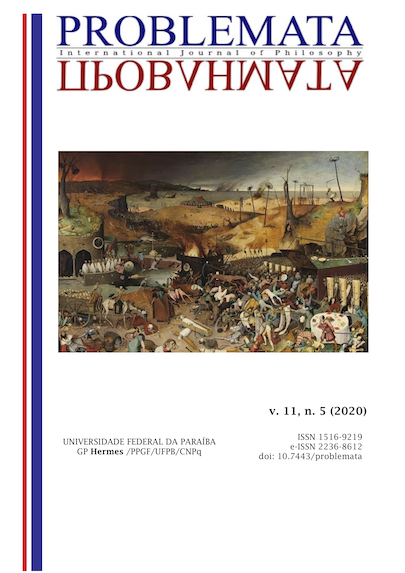PLATO AND NIETZSCHE, A CONFLICT BETWEEN ACRASIA AND WILL TO POWER
DOI:
https://doi.org/10.7443/problemata.v11i5.51142Keywords:
Acrasia, Will to power, RelationshipAbstract
This research proposal deals with a possible relationship between the Platonic concept of acrasia and the nietzschean concept of will to power. What is specific to the constitution of both terms, has a common root, does not have a conduct of different use, only a philosophical position on the implementation of such an approach, that is, a matter of perspective. A research will be divided into different moments, in order to validate a conjecture proposal. In the first instance, export Plato's panoramic mode and understanding of the problem of acrasia as an anomaly that would lead to an excess and therefore harmful conduct for individuals and society. In a second moment, expose Nietzsche's understanding of the will to power, as constituted by himself and with life value, seeking to show a possible choice between the two terms, correlating them with a human conduct and proposing a similarity between the two. thoughts of Plato and Friedrich Nietzsche (1844-1900).
Downloads
References
BARRENECHEA, Miguel. Nietzsche e o corpo. 2ª ed. Rio de Janeiro: 7 Letras, 2017.
BOBONICH, Christopher. Plato’s Utopia Recast. New York: Clarendon Press – Oxford, 2002.
FEITOSA, Z. M. L. A questão da acrasia na filosofia de Platão. In: Prometeus Filosofia. v. 23, p.216-228, 2017.
FERRARI, G. R. F. The three-part soul. In: Plato’s Republic, edited by G. R. F. Ferrari, New York: Cambridge University Press, 2007.
FONSECA, Ana Caroline. Os dois sentidos da crítica nietzschiana: Sócrates como um caso exemplar. In: Veritas, Porto Alegre, v. 57, n. 1, p. 41-51, jan. 2012.
GIACOIA, Oswaldo. O Platão de Nietzsche O Nietzsche de Platão. In: Cadernos Nietzsche, v. 3, p. 23-36, 1997.
NASCIMENTO, D. S. O problema da acrasia em Platão e Aristóteles. Tese (Doutorado em Filosofia) – Pontifícia Universidade Católica do Rio de Janeiro, 2013.
NIETZSCHE, F. Assim falava Zaratustra. São Paulo: Companhia das Letras, 2011.
______. Além do bem e do mal. São Paulo: Companhia das Letras, 1998.
PLATÃO, Protágoras, Col. Diálogos, tradução: Carlos Alberto Nunes, Belém: Ed. UFPA, 1980.
______. A república, Col. Diálogos, tradução: Carlos Alberto Nunes, Belém: Ed. UFPA, 2000.
REIS, Dulce. Por uma nova interpretação das doutrinas escritas: A filosofia de Platão é triádica. In Kriterion, Belo Horizonte, nº116, Dez/2017, p.379-398.
ROBINSON, Thomas. As características definidoras do dualismo alma-corpo nos escritos de Platão. Letras Clássicas, Universidade de Toronto, nº2, 1998, p.335-356.
WEISS, Roslyn. The socratic paradox and it’s enemies. Chicago: University of Chicago Press, 2006.
Downloads
Published
Issue
Section
License
Authors who publish with this journal agree to the following terms:
- Authors retain copyright and grant the journal right of first publication with the work simultaneously licensed under a Creative Commons Attribution License that allows others to share the work with an acknowledgement of the work's authorship and initial publication in this journal.
- Authors are able to enter into separate, additional contractual arrangements for the non-exclusive distribution of the journal's published version of the work (e.g., post it to an institutional repository or publish it in a book), with an acknowledgement of its initial publication in this journal.
-
- Authors are permitted and encouraged to post their work online (e.g., in institutional repositories or on their website) prior to and during the submission process, as it can lead to productive exchanges, as well as earlier and greater citation of published work (See The Effect of Open Access).





